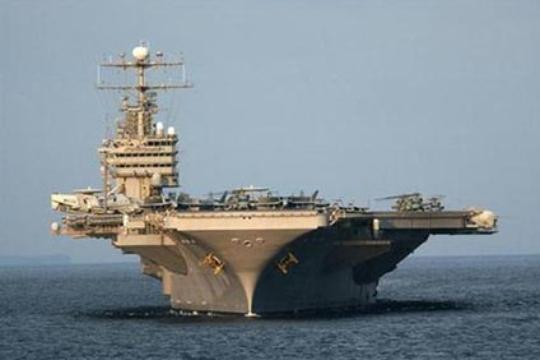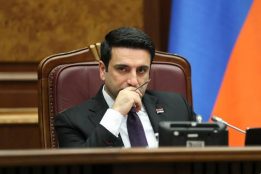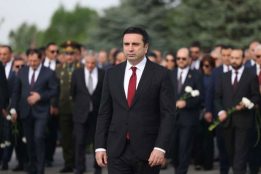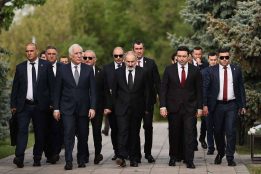
Jon B. Alterman from CSIS Washington touched upon America’s potential involvement in Iran. Find the article below.
An aircraft carrier is a scarce resource. The United States has eleven carriers in its entire fleet, and only about half can deploy at any given time. According to the website globalsecurity.org, five U.S. carriers are currently at sea, and two of them are currently off the coast of Iran. That’s a lot of firepower directed toward one target, especially when few expect U.S. tensions with Iran to vanish—or even diminish—any time soon.
It is easy to remember how we got here. Major U.S. military operations in Iraq and Afghanistan brought with them a large troop contingent (including carri¬ers), some of which could be adapted toward securing global energy security in case of a crisis. With 20 percent of the world’s traded oil flowing out of the Gulf through the Strait of Hormuz, the world could not afford an interruption, and the United States is the only power with the ability to secure the Strait. So as the troops flowed out, carrier strike groups remained and picked up much of the slack.
With a diminishing U.S. presence in the neighborhood, and with global tensions with Iran rising, many see the carriers as a way to both deter Iranian aggres¬sion and reassure allies of the U.S. commitment to their security. Yet, the cost of doing so is high, and the cost of doing so on an enduring basis may become unsustainable in the face of a shrinking defense budget. It is worth thinking of alternatives, and I attended a quiet meeting this week that explored a few.
To do so, one must think first about the kinds of scenarios in which Iran might act militarily, and how Iran might do it. One possibility is that Iran might seek to respond to an attack on its nuclear facilities, and another is that it might seek to escalate after a Western response to an Iranian provocation (such as Iran’s capture of 15 British sailors in 2007). In either event, it seems unlikely that the Iranian response would be large-scale, immediate, and conventional. Even with a reduced U.S. military footprint in the Gulf, Iran is too outgunned to win such a confrontation with a potential foe, or even to play to a draw. Inviting a symmetrical conflict would be to invite a humiliating Iranian defeat.
Instead, Iran’s comparative weakness in conventional terms means it would probably seek to conduct an asymmetrical attack at the time and place of its choosing — and probably one that offered plausible deniability, which mining the Strait of Hormuz does not. From military action to cybercrime, Iran’s strong suit is using relatively rudimentary tools innovatively rather than employing overwhelming force or sophistication. An asymmetrical strategy would make it harder for the United States to respond to Iran.
Whichever path or paths Iran chose, however, the issue for the United States is not that Iran has an overwhelming ability to inflict costs on the world. Instead, the issue is whether and how the United States restrains itself in responding to Iranian provocations.
The nature of U.S. restraint matters. Murmurs out of the U.S. Central Command suggest the United States has a comprehensive plan to destroy Iran’s conventional military capability over a series of weeks. Air defense systems, missile batteries along the shore, and Iran’s submarine fleet all seem like likely targets. Given the large number of U.S. military assets in the area, it seems within U.S. capabilities.
Yet, if the principal goal of a military action were to have a political effect, is that the only way forward? If, for example, the United States could demonstrate overwhelming military capabilities with a more modest set of assets and against a more symbolically powerful set of targets, would that have even more of a deterrent effect?
There is reason to think it would. For example, the extensive sanctions in place against Iran make clear the breadth of Iranian activities that are either run by the Iranian Revolutionary Corps (IRGC) or affiliated groups, and which the international community by implication considers to be part of the country’s military infrastructure. The ubiquity of the IRGC throughout the Iranian economy creates a wide range of potential targets.
If the United States sought to cripple the Iranian ability to export its oil, it could do so swiftly. It would not need a carrier—let alone two—to destroy the oil export platforms at Kharg Island. Special forces could carry out a range of assaults as well, highlighting the mismatch between Iranian and U.S. capabilities.
Similarly, the United States could blockade Iran far more easily than Iran could blockade the Gulf, should matters come to that. Such an action would not decisively end any Iranian threat, but it would demonstrate U.S. abilities and commitment to both the Iranian government and to our allies.
Were the United States to convert to a lighter footprint in the Gulf, however, there is a danger that both U.S. allies and the Iranians would see it as a retreat. Crucial to success is assuring friends and foes this is not the case.
U.S. strategy has a strong preference for forcing people into our comfort zone of conventional warfare against clear military targets, and it does not always ap¬preciate the symbolic impacts of U.S. actions. Maintaining two carriers in the Gulf allows the United States to fight the former kind of war well, and to win it decisively. With budgets constricting and Asia growing in importance, staying in the U.S. comfort zone may become a luxury.
There are ways to deter Iran other than showing the U.S. willingness to fight a long conventional war. These alternatives are more credible than a massive as¬sault, and they stretch the U.S. budget and U.S. forces far less. We ourselves are the principal obstacles to pursuing such a strategy. We may not be able to afford to do so much longer.




































